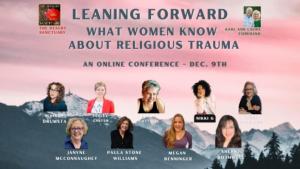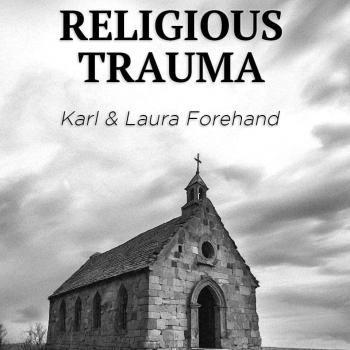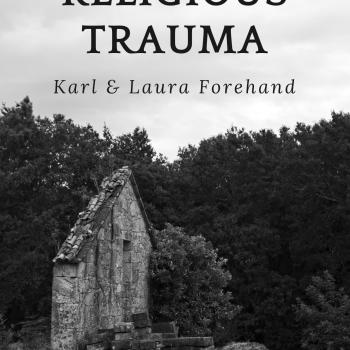What I Learned from Women about Religious Trauma

I was a pastor for almost 20 years, and one of my deepest regrets is that I didn’t listen to the intuition of my wife, Laura. For most of my life, I have longed to understand women, but many of the systems of the world are designed to do just the opposite, and they ignore women’s voices.
This past weekend, the Desert Sanctuary hosted an online conference called Leaning Forward: What Women Know About Religious Trauma. After some recent events, I was anxious to learn more about trauma from a woman’s point of view, but the wisdom that emerged from that conference was much deeper than I originally expected.

All of it is recorded, so we decided to release it slowly, along with pointers to resources that each of these speakers use in their everyday interactions with abuse survivors. There is no cost, except a plea for a what you can do type of donation to help offset costs.
When I listen to a group of speakers, the way I find wisdom from it has at least two aspects. The first is I try to listen to something that resonates deep inside me. Those things must often be sorted through deep contemplation and given time to ensure they still make sense after the event’s emotion.
But the other way I glean wisdom is when I hear things repeated from different people and stories. Please understand that just because politicians or groups of people or pastors keep repeating the same things doesn’t make it true. But when nine women from various walks of life share their wisdom without being paid and without provocation, I listen especially to the things that are repeated. The same thing happens in our podcast, The Desert Sanctuary. After listening to more than 300 episodes and stories, we tend to notice the things that get repeated in people’s stories.
The following things were obvious from our conference last weekend, in no particular order. If I say anything with authority in this blog, it is because I have heard it repeatedly from women speaking with emotion and angst about it.
What I Learned from Women about Religious Trauma
Stop Interrupting Us
Men have been taught to give advice. And not just that we want to give advice, we are in a hurry to give it, and we assume because of how we’ve been conditioned that it can’t wait. In the process, we don’t hear what women are trying to tell us with their stories. It’s almost like a movie we don’t want to watch for men because we don’t know how it will turn out. So, we give our opinion before it’s even asked for because we have been taught that we need to have the answers.
Women repeatedly say, “Stop Interrupting us,” but it seems that we can’t help ourselves. Paula Stone Williams, a trans woman who has experienced both sides, brought receipts and shared statistics of how often men and women interrupt each other. I’ll let you listen to the talks to learn more.
Patriarchy is a System that Benefits Men
At first, this seems like an obvious statement that we all understand, but there are some nuances to it buried just beneath the surface. The patriarchy is not comprised of men only, but it is a system that benefits men. Somehow, we have convinced ourselves that it also benefits women. We assume that it does, and we keep acting like it does, but the testimony of women is that it only hurts them and benefits men.
The other side that several of the women stressed is that the patriarchy is not just hurting women, but it is also hurting men as well. Christians have pointed to the past to get approval to continue the Patriarchy. Still, if we are honest, it has never served humanity well primarily because it ignored half of the voices. Just because Paul or someone else in a holy book seems to condone it doesn’t mean that is the most efficient way to move forward. The people of the past condoned slavery by doing what they were conditioned to do. It doesn’t make it right! It’s time to lean forward!
We Need Each Other
Often, when we start to discuss issues with men and women, men assume that women are trying to remove them from participating. We could easily assume that because our conference only had women speakers. But most of the women assured me strongly, in different ways, that they were not trying to bash men or eliminate men from the equation.
We probably haven’t solved this in the evolution of society because it’s a difficult issue. It will take more than just good intentions or a quick fix—it might take a concerted effort over long periods and a reasonable amount of listening. But I invite you to look into the eyes of several of the women who spoke when they said with all sincerity, “We still need you…But you need us, too!”
Listen to Survivor Stories
Most pastors I know have at least a secondary goal, if not primary, to serve and help people, especially those in need. One of the greatest needs we have in our communities is that there are multitudes of abuse survivors. It’s not just out in the “world” but in the pew (thanks Janyne McConnaughey). The Global Center for Religious Trauma (GCRR) says, “After compiling data from 1,581 adults living in the United States, this study concludes it is likely that around one-third (27‒33%) of U.S. adults (conservatively) have experienced religious trauma at some point in their life.”
As a pastor, I now realize the books that lined my shelves in the past were mainly theology and leadership books that helped me deliver sermons and discover the next strategies for building an organization. What was noticeably absent from my mountain of books were stories of abuse survivors, especially if they were a woman. They didn’t seem relevant or interesting, but my female companions on this journey stressed that they are not just important—they are necessary!
Other Things I Learned
I also learned the difference between an activist and an advocate. Activists are concerned with changing systems, and advocates are concerned with supporting people. According to the speakers, we can’t change people, which I think we know, but we forget it when trying to help somehow. These thoughts are worth contemplating because the systems must change, but it’s very hard to change systems, so we fight and argue with people and sometimes do more damage than good.
A few of the speakers, like my wife, Laura Forehand, told survivor stories from their abuse. One was about purity culture, and another was about a pastor’s wife regaining her voice. I admire them for using their voices to tell their stories, illuminate the issues with the systems we participate in, and sometimes shed light on individuals who have been abusers. As you can imagine, this causes some consternation among those who have been abusers, to which at least some of my female friends respond, “You shouldn’t have done things you don’t want made public.”
I wouldn’t waste my time hosting conferences like this if I didn’t believe that men were capable of change. I don’t believe the work that needs to be done is easy or simple—it’s somewhat complex and very hard work. I know because I’ve done some of it myself.
But what I know about men is that they’re not afraid of the hard if someone will tell them the truth about what it takes to do better. Many other men have taken refuge in the less difficult harbor of complacency. They must do the hard work of confessing their sins, giving up some of the spoils of their barbarous conquests, and deferring to those who know the way forward. It’s okay that we didn’t know before, but now that we know, it’s time to do the right thing!
Listen to survivor stories. Do what you can to take down the Patriarchy and amplify women’s voices. Then, realize your privilege and use it to lift those less fortunate. Realize it’s OK that you didn’t know and were conditioned, but staying that way is not OK!
Do the hard work to finish strong!
Be where you are,
Be who you are,
Be at peace,
Karl Forehand
Reclaiming Married Sex from Purity Culture – Megan Benninger
Tending the Wounds of Religious Trauma with Rebekah Drumsta
Our first featured speaker:
 About Karl Forehand
About Karl Forehand













